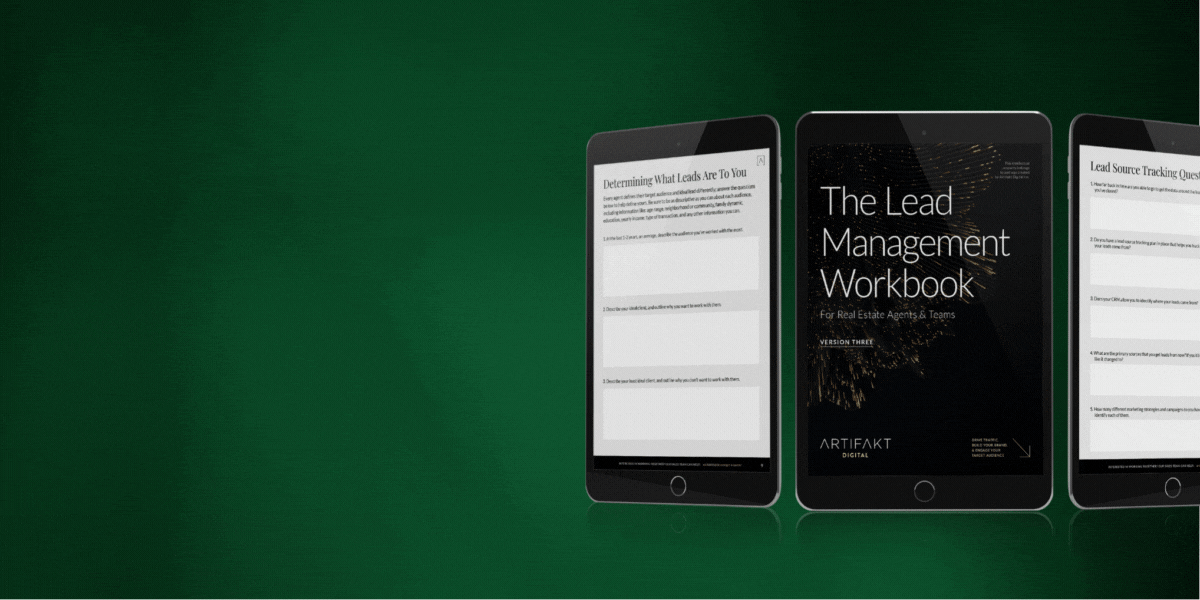Planning Your Digital Strategy for the New Year

The landscape of digital strategy is always changing. As a real estate agent, you need to change what you’re doing in order to adapt and grow while gaining more traffic, leads, and deals.
If you, like many successful agents, are looking to set yearly goals, they should all start with your digital strategy. That said, where do you start?
A little while ago, we released our Digital Business Planning Workbook for Real Estate Agents. It’s only been out for a couple of months, but we’ve already got a lot of great feedback on it.
That’s because most agents don’t really know where to start when it comes to planning out their digital strategy goals. It’s why we put together our workbook: to serve as a starting point.
For this, our last post on Views for 2019, we wanted to outline some of the highlights of the workbook so you can begin planning your digital strategy for 2020. It’s all below, and if it resonates with you, then download our workbook right here (or after you’ve finished this article).
Now, let’s get started. To plan your digital strategy, you should look at these 4 key areas (all of which are explained in greater detail in our Digital Business Planning Workbook):
1. Your Brand Strategy
As a real estate agent, your branding is everything.
A lot of agents rely on their brokerages for brand direction, but that can often backfire. Let’s say your brokerage does a full-scale overhaul of their brand, or maybe you choose to leave them. Tying your brand completely to your brokerage can often leave agents high and dry.
We believe it’s better to invest in yourself as the brand, so you’re not totally reliant on your brokerage. The main thing here, though, is to know that your brand is far more than a logo…
Branding is about building trust. It’s also about connecting, establishing recognition, and turning your customers into brand advocates. This way, you can build your referral business.
Moreover, a good brand is consistent. It looks the same regardless of medium: in print, on your website, or even on social media. Your branding should create a memorable experience and impression that attracts the right people at the right time.
Start by looking at what you’re doing now. From there, outline 5 opportunities you can use to build your brand and make it more consistent over the next 12 months.
2. Your SEO Strategy
Search Engine Optimization (SEO) is a strategy deeply rooted in the process. For this reason, it should be distributed across both organic and paid search channels.
To start, you should look at the basic data from your website’s analytics, such as:
- Traffic sources
- Keyword rankings
- Backlinks
- Domain authority
From there, identify opportunities to rank better and more often for the keywords and phrases that your audience wants to see.
★ Want to learn more about SEO? Check out our article right here on how to build a well-rounded, comprehensive SEO strategy for real estate.
3. Your Content Strategy
Ever heard the saying “Content is King”?
It’s absolutely true. The content on your website plays a pivotal role in attracting the right people, building trust, communicating value and authority, and then making those people do what you want.
A good content strategy includes all of the words on your website, as well as your strategy for adding new content throughout the year via additional pages and blog posts.
Most agents breathe a sign of relief once their website content is completed. That’s because they think they’re ‘done’, but they’re not done. A content strategy is never finished.
What you need to do is continually optimize and add to your content strategy. This could be based on who you want to interact with, and what will attract and resonate with them.
Have a read through your content and ask yourself:
- Is the content on your website written for you or for your audience?
- Does it offer something of value?
- Will it resonate with people?
- What plan do you have for building your content into 2020?
A proper digital strategy will answer all these questions and more.

4. Your Lead Generation Strategy
True or false: Once your website is complete and online, the next step is to sit back and wait for the leads to roll in. False.
There’s a big difference between your website strategy and your marketing strategy. For that reason, you need to consider both equally.
A good lead-generation strategy covers all of the bases: organic SEO, paid search, content strategy, social strategy, even print marketing. But, it’s important to understand that there are two types of lead generation strategies: ongoing and campaigns.
- Ongoing lead generation is the strategy you do continuously, such as your ongoing SEO and content strategy. They are the parts of the strategy that are constant.
- Campaign lead generation is the strategy you do from time to time, like a marketing campaign timed for the Spring market or the holiday season. This type of strategy can often cover multiple avenues, like print marketing, social media, etc.
Start by examining your goals. Most agents just want to get leads, but don’t really think about the types of leads they want. What you should focus on is diversifying and presenting value to various lead segments.
That’s because different campaigns appeal to different markets and bring in different leads. The more specific you get, and the more feasible your solution, the higher the quality of the lead becomes.
Want to generate more sales by implementing a lead and client nurturing strategy? Download our Lead Nurturing Workbook. It’s a self-guided, interactive workbook where you answer questions about how you attract, handle, and market to your incoming leads, and put together a plan to implement a solid lead nurturing strategy that gets results. And, it’s free to download.






















